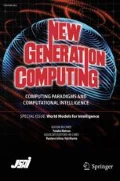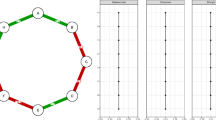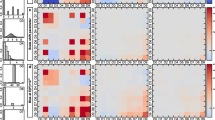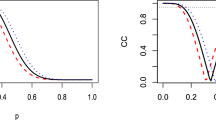Abstract
We study BIC-like model selection criteria and in particular, their refinements that include a constant term involving the Fisher information matrix. We perform numerical simulations that enable increasingly accurate approximation of this constant in the case of Bayesian networks. We observe that for complex Bayesian network models, the constant term is a negative number with a very large absolute value that dominates the other terms for small and moderate sample sizes. For networks with a fixed number of parameters, d, the leading term in the complexity penalty, which is proportional to d, is the same. However, as we show, the constant term can vary significantly depending on the network structure even if the number of parameters is fixed. Based on our experiments, we conjecture that the distribution of the nodes’ outdegree is a key factor. Furthermore, we demonstrate that the constant term can have a dramatic effect on model selection performance for small sample sizes.





Similar content being viewed by others
Notes
We denote the binary (base-2) logarithm by \(\log \) and the natural logarithm by \(\ln \).
Based on the observations in Sect. 4, which make it clear that Bayesian networks with a fixed number of parameters can have large differences in FII values, we evaluate the constants for individual networks instead of using the same complexity penalty for all networks with a fixed number of parameters.
References
Clarke, B.S., Barron, A.R.: Jeffreys prior is asymptotically least favorable under entropy risk. J. Stat. Plan. Inference 41(1), 37–61 (1994)
Grünwald, P.D.: The minimum description length principle. MIT Press, Cambridge (2007)
Han, C., Carlin, B.P.: Markov chain Monte Carlo methods for computing Bayes factors. J. Am. Stat. Assoc. 96(455), 1122–1132 (2001)
Jeffreys, H.: An invariant form for the prior probability in estimation problems. J. R. Stat. Soc. A. 186(1007), 453–461 (1946)
Kass, R.E., Raftery, A.E.: Bayes factors. J. Am. Stat. Assoc. 90(430), 773–795 (1995)
Kontkanen, P., Myllymäki, P.: A linear-time algorithm for computing the multinomial stochastic complexity. Inf. Process. Lett. 103(6), 227–233 (2007)
Kontkanen, P., Myllymäki, P., Silander, T., Tirri, H., Grünwald, P.: On predictive distributions and Bayesian networks. Stat. Comput. 10, 39–54 (2000)
Krichevsky, R., Trofimov, V.: The performance of universal coding. IEEE Trans. Inf. Theory 27(2), 199–207 (1981)
Navarro, D.: A note on the applied use of MDL approximations. Neural Comput. 16(9), 1763–1768 (2004)
Rasmussen, C. E., Ghahramani, Z.: “Occam’s razor”. In: Adv. Neural Inf. Process. Syst. (Leen, T., Dietterich T., Tresp, V.), pp. 294–300 (2001)
Rissanen, J.: Fisher information and stochastic complexity. IEEE Trans. Inf. Theory 42(1), 40–47 (1996)
Rissanen, J.: Information and complexity in statistical modeling. Springer, New York (2007)
Roos, T.: Monte Carlo estimation of minimax regret with an application to MDL model selection. In: Proc. IEEE Information Theory Workshop, IEEE Press, pp. 284–288 (2008)
Roos, T., Rissanen, J: On sequentially normalized maximum likelihood models. In: Proc. Workshop on Information Theoretic Methods in Science and Engineering (WITMSE-08) (Rissanen, J., Liski, E., Tabus, I., Myllymäki, P., Kontoyiannis, I., Heikkonen, J.), Tampere, Finland (2008)
Roos, T., Zou, Y.: Keep it simple stupid—on the effect of lower-order terms in BIC-like criteria. In: Information Theory and Applications Workshop (ITA), IEEE Press, pp. 1–7 (2013)
Schwarz, G.: Estimating the dimension of a model. Ann. Stat. 6, 461–464 (1978)
Shtarkov, Y.M.: Universal sequential coding of single messages. Prob. Inf. Transm. 23(3), 3–17 (1987)
Silander, T., Roos, T., Kontkanen, P., Myllymäki, P.: Factorized normalized maximum likelihood criterion for learning Bayesian network structures. In: Proc. 4th European Workshop on Probabilistic Graphical Models (PGM-08) (Jaeger, M., Nielsen, T. D.), pp. 257–272 (2008)
Silander, T., Roos, T., Myllymäki, P.: Learning locally minimax optimal Bayesian networks. Int. J. Approx. Reason 51(5), 544–557 (2010)
Ueno, M.: Robust learning Bayesian networks for prior belief. In: Proc. Uncertainty in Artificial Intelligence (UAI-2011) (Cozman, F.G., Pfeffer, A.), Barcelona, Spain, pp. 698–707 (2011)
Xie, Q., Barron, A.R.: Asymptotic minimax regret for data compression, gambling, and prediction. IEEE Trans. Inf. Theory 46(2), 431–445 (2000)
Acknowledgements
An earlier version of this paper was presented at the Second Workshop on Advanced Methodologies for Bayesian Networks (AMBN 2015) in Yokohama. The authors thank the anonymous reviewers for insightful comments and suggestions and the organizers of AMBN-2015 for their invitation to submit this work to this special issue. This work was funded in part by the Academy of Finland (Centre-of-Excellence COIN).
Author information
Authors and Affiliations
Corresponding author
About this article
Cite this article
Zou, Y., Roos, T. On Model Selection, Bayesian Networks, and the Fisher Information Integral. New Gener. Comput. 35, 5–27 (2017). https://doi.org/10.1007/s00354-016-0002-y
Received:
Accepted:
Published:
Issue Date:
DOI: https://doi.org/10.1007/s00354-016-0002-y




